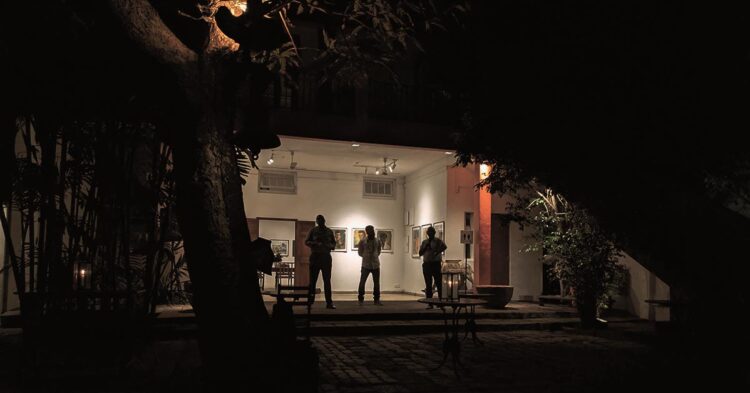On the 27th of August, Spike Colombo greeted Dr. Nirmal de Silva and Chandula Abeywickrema to take the spotlight. Well known for their hit show, Ath Pavura, Dr. Nirmal and Chandula took the spotlight to talk about social enterprises and impact investing.
Debunking myths around social enterprises
Dr. Nirmal kicked things off by clarifying some of the misconceptions surrounding social enterprises. The first, is the idea that social enterprises aren’t supposed to make profits. Dr. Nirmal specifies that profit should indeed be a vital factor. But it’s important to understand that social enterprises shouldn’t look at profit maximization. This leads to the next misconception, competition. Being a social enterprise is not all that different from any other business. Competition plays a key role even in this space. “It isn’t automatic sustainability. You can be a social enterprise and definitely fail”, mentions Dr. Nirmal.
Another myth was that social enterprises depend on grants or donations. Dr. Nirmal notes that isn’t the case. Yes, grants may be a part of the equation. But it shouldn’t dictate the operation of the business itself. Social enterprises should be self-sustaining.
Then there’s the misconception around impact. Yes, impact is key. But as Dr. Nirmal says, the simple question is, impact for whom? He adds that more often than not, people tend to forget that every enterprise is there to create an impact. But on the other hand, it’s important to identify if a particular enterprise actually does create an impact. This would usually be in the form of either for the society, environment or culture.
Challenges of a social enterprise
One of the biggest problems of social enterprises in Sri Lanka is that most such enterprises don’t validate their ideas. The concept of a Minimum Viable Product is alien to social entrepreneurs. But then again, this is a persisting issue even in the startup space. Poor marketing also haunts social enterprises. Adding to these, poor management and people skills make the sustainability of these operations questionable.

There are also external challenges that social enterprises often face. One of the most prominent is raising capital. If you’re a social enterprise and you approach a bank for funding, you can be almost certain the bank will reject you.
Of course, a lot of these issues aren’t unique to social enterprises. Startups and other types of businesses face similar challenges on a regular basis. But for these enterprises, a lot has to do with the emotional element that’s involved in the entire process. This essentially makes things tricky for social enterprises. For example, you might be passionate about the environment and think that banana leaves would be a good alternative for everyday polythene lunch wraps. It sounds like a great idea. But it won’t really sustain unless the idea is validated.
As Dr. Nirmal puts it, It’s a matter of translating from a share of heart to a share of wallet.
Impact investing and the LIIN effect
Switching gears, Chandula Abeywickrema, Co-Founder of Lanka Impact Investing Network (LIIN) talked about impact investing. Chandula also talked about how LIIN wants to help Social Enterprises to come to what he calls AAA. status. Affordable, Accessible, Available. Additionally, LIIN is also looking to build an ecosystem around impact investing in Sri Lanka. For this, the organization aims to tackle a few specific areas.

One of these areas is how certain entrepreneurs can be close-minded when it comes to business partners and company operations. “We found that it’s a strange experience for Sri Lankan entrepreneurs to invite someone from outside to become a business partner. They want the business to remain in the family”, mentions Chandula.
Another area of focus is on getting prospective social entrepreneurs from the ideation to the commercialization stage. A lot of young people have ideas. But what happens is that these ideas go untested. According to Chandula, this becomes problematic when grass-root-level issues aren’t understood properly. So it’s vital to look at things from a grass-root level in order to get the actual requirements before pushing forward with an idea.
As a result, Chandula notes that there’s quite a bit of awareness creation and thorough guidance involved from LIIN’s part. But beyond this, there’s also the actual building of the network itself and growing it to be sustainable. This is where the other stakeholders come in.

According to Chandula, 14 – 15 business leaders have already pledged to invest their private money into social enterprises as equity, starting from LKR 250,000 to LKR 10 million. Beyond this, LIIN has also created two funds. One at USD 5 million, the other at ranging ticket sizes from USD 5,000 to USD 100,000 a month. With this, Chandula says, that LIIN is actively looking for seed level funding as well as growth-level funding as an equity partner.
In addition to investors and funding, LIIN has also partnered with the likes of Social Enterprise Lanka, Lanka Social Ventures, Good Market, etc. as a means of fostering the impact investing ecosystem.
Learnings from Ath Pavura
With regards to Ath Pavura, Dr. Nirmal and Chandula shared their learnings from the popular program. Chandula notes that Sri Lankan entrepreneurs have a particular liking to raise funds via bank loans over equity. “Giving access to equity is a totally different engagement for them”, remarks Chandula. Why? With equity, more variables are added to the equation. Investors, incorporating a limited liability company, running your finances, and paying taxes, are all seen as complications that entrepreneurs don’t want to deal with. Hence, the preference for bank loans.
For Dr. Nirmal, compliance is key. He goes on to say that most social entrepreneurs don’t really think through when it comes to things like compliance and quality control. But on the positive side of things, Dr. Nirmal mentions that he feels there’s no shortage of talent and skills when it comes to Sri Lankans. Often, all that’s needed is to give these talented efforts some push.
FROM NAWAGATHTHEGAMA TO KEBITHIGOLLEWA TO JAFFNA, RURAL OR URBAN, SRI LANKANS HAVE IDEAS TO CREATE MEANINGFUL IMPACTS
Dr. Nirmal de Silva
With that, the August edition of Spike Colombo comes to a close. If you’re curious to know more about LIIN, you can check here. You can follow Spike Colombo for the latest.
In case you missed last month’s meetup about design sprints, you can check it out here.







GIPHY App Key not set. Please check settings